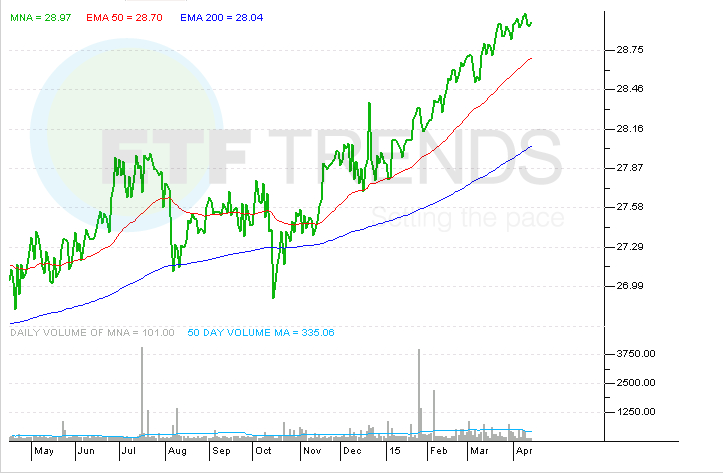Merger Arbitrage ETF End of Comcast/Time Warner Deal
The cable industry was rattled somewhat Friday as investors digested news that Comcast (CMCSA) is abandoning its $45 billion effort to acquire rival Time Warner Cable (TWC).
Investors are cheering the news as shares of Time Warner Cable are up 3.6% on volume that is already more than triple the daily average while Comcast is trading modestly higher. The Index IQ Merger Arbitrage ETF (MNA) is also no worse for the wear, trading only slightly lower today.
MNA and rival M&A ETFs provide investors with a diversified approach to a group of takeover targets. The ETFs employ a type of alternative, “directional hedge fund strategy” called merger arbitrage. Specifically, the funds capture the spread or difference between a stock’s trading price before a deal is announced and its eventual takeover price. [A Look at M&A ETFs]
Translation: Saying that MNA stands to benefit from increased mergers and acquisitions isn’t entirely accurate. Nor is it reasonable to expect that every big deal, either announced or rumored, will lift MNA because the ETF does not speculate by adding rumored takeover targets. That would amount to an active strategy whereas MNA is a passive ETF that makes a strategy used by professionals accessible to investors of all stripes.
Merger arbitrage ETFs includes stocks of target companies in anticipation of earning a premium paid for the targeted stock once an announced deal closes. Additionally, it takes short positions in some acquirers as a potential hedge in the acquirer’s stock. [Play M&A Like a Pro With This ETF]
MNA does not hold shares of Comcast or Time Warner Cable. Time Warner Cable entered MNA in March 2014, but the ETF’s holdings have a shelf life of 360 days within the fund, so when MNA rebalanced last month, Time Warner Cable departed. That disciplined, rules-based methodology removes emotion from the equation, in turn diminishing investor risk.
The strategy works and does so with relatively low correlations to traditional equity indexes. MNA has offered nearly double the performance of HFR Merger Arbitrage Index over the past two years. According to Morningstar, these types of funds are 0.66 correlated to the S&P Index – investments move perfectly in lockstep when correlation is at 1.0. Additionally, funds that arbitrage a broad range of markets like MNA have a correlation of 0.25 to the S&P 500. [Nifty Hedge Fund ETFs]
Investors like MNA’s story as highlighted by the $37.1 million added to the ETF this year. MNA’s top holdings currently include Kraft (KRFT), Baker Hughes (BHI) and Pharmacyclics (PCYC).
IQ Merger Arbitrage ETF

